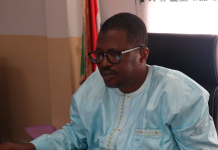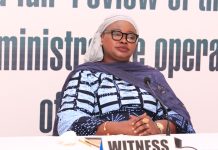 celebrating the 50th Anniversary (Golden Jubilee) of our independence from British colonial rule. We have come a long way from the First Republic’s policies on agriculture production to the current Republic’s initiatives on food self-sufficiency. In between these two periods, many factors contributed to the increase or decrease in the food production efforts. But before I go further, let me salute my late parents (life-long farmers) and all late and surviving Gambian farmers who toiled or continue to toil under the sun to feed the whole nation. Bravo to all of you!!
Producing enough food is NOT a challenge. The challenge is how The Gambia’s mindset should be channeled toward the certainty that we can produce enough of our own food. Generally, if you conceive in your mind that you cannot produce anything, you will NOT be able to produce anything. A classical example is America’s dream to get to the moon and they did it with all perceived and real challenges. Some may argue that the United States planned the trip to the moon many years before they got there and that they had the resources to do it. Yes, that is true; but The Gambia too planned the idea of feeding herself since we gained our independence from Great Britain in 1965 and we still have the required resources ( i.e. available land, abundant fresh water supply, human labor, educated people, and some financial resources) to do it. For the older generation (i.e. those who witnessed the political leadership of Sir Dawda Kairaba Jawara of the First Republic), do you remember the political philosophy of “Tesito” coined by Sir Dawda which interprets as self-reliance? For the younger generation (i.e. those who were born at the dawn of the Second Republic), do the political philosophies like Eat What You Grow and Grow What You Eat, Vision 2020, and Vision 2016 ring a bell? All these ideas were conceived many years ago and most recently and now the onus on all of us is to implement and achieve the desired goal of feeding ourselves. How do I think we can do that? Please follow me here.
Strategy 1: By the month of May each year, I travel to my home village of Missira, Sandu District, URR and I have a cereal (millet, sorghum, and rice) production plan discussed with some of the farmers in the village and some of the surrounding villages. The discussions are based on the assurance that if they produce enough cereals at harvest time, I will buy some from them. In each year, I buy ten 50-kg bags of cereals and two 50-kg bags of local rice; that means I buy 600kg of cereal each year. Each 50kg-bag costs me between D700 (seven hundred dalasis) and D800 (eight hundred dalasis). This means that I spend D8,400 (eight thousand four hunderd dalasis) to D9,600 (nine thousand six hundred dalasis) per year to have enough food for my nuclear family of 5 people for the whole year. A Gambian consumes 117kg of cereal per year. How does that sound to you? A monthly-paid employee can save about D10,000 per year to buy cereals to feed his/her nuclear family of five members. How about the extended family members? Let them try it on their own like you do. There should be no room for complacency. All the Gambian farmer needs is the assurance that his/her farm produce will be readily sold at harvest!!
Strategy 2: If you want to produce more cereals, hire labor and let them do the farm work for you. This is even better than Strategy 1 if it works out BUT the tendency of having an unreliable work force is high. I have experienced it in two years where I hired a labor force to work on my cereal farm. In the end, my cost of production went up and my yield was very, very low. I was not around the workers all the time to supervise their work. There were many absences, for one reason or another, during farm work hours.
Strategy 3: If you cannot save D10,000 on your own to buy cereals in a year, you can borrow that amount of money from your local bank and invest it according to Strategy 1 above OR if you have a relative in the Western world, ask him or her to send you D10,000 ONLY in a year to get you going with Strategy 1.
Strategy 4: The rich Gambians at home and abroad should start investing in cereal production in the country. Food production business is the surest way of making big money because clients cannot live without food but they can live without a pair of shoes. Any example? Generally, to become a politician in the United States, you have to be a millionaire because it takes a lot of money to be elected to office. That means, many, many US elected office holders are millionaire farmers, at least at the Federal level. The Gambia private sector should be the driving engine of this “ship” called food self-sufficiency. Other opportunities like investing in beef production and processing, fishing business, and small ruminant business are abound in The Gambia. You have the money and the land. Get an agriculture professional as a partner to start the business venture. If Dr. X ( real name withheld per his instruction) and I are in a similar partnership and we are producing enough vegetables for our families and making money at the same time, so can you.
Strategy 5: The Gambia government should collaborate with and fund local NGOs like WASDA to invest in rice and other cereal production with the local farmers. This Strategy will be a supplement to Strategies 1, 2, 3, and 4 above.
The time has passed when we Gambians, especially the educated, should sit and drink Attaya (China green tea) every day before, during, and after work and talk too much about nothing. If I can apply Strategy1and 4, respectively, and they have been working for me for all these years, so can you. Have I ruffled any feathers so far? Please don’t feel offended. I just want you and your family to be self-sufficient in food in the shortest time possible.
Sidat Yaffa, Ph.D.
Contact: [email protected]
]]>
celebrating the 50th Anniversary (Golden Jubilee) of our independence from British colonial rule. We have come a long way from the First Republic’s policies on agriculture production to the current Republic’s initiatives on food self-sufficiency. In between these two periods, many factors contributed to the increase or decrease in the food production efforts. But before I go further, let me salute my late parents (life-long farmers) and all late and surviving Gambian farmers who toiled or continue to toil under the sun to feed the whole nation. Bravo to all of you!!
Producing enough food is NOT a challenge. The challenge is how The Gambia’s mindset should be channeled toward the certainty that we can produce enough of our own food. Generally, if you conceive in your mind that you cannot produce anything, you will NOT be able to produce anything. A classical example is America’s dream to get to the moon and they did it with all perceived and real challenges. Some may argue that the United States planned the trip to the moon many years before they got there and that they had the resources to do it. Yes, that is true; but The Gambia too planned the idea of feeding herself since we gained our independence from Great Britain in 1965 and we still have the required resources ( i.e. available land, abundant fresh water supply, human labor, educated people, and some financial resources) to do it. For the older generation (i.e. those who witnessed the political leadership of Sir Dawda Kairaba Jawara of the First Republic), do you remember the political philosophy of “Tesito” coined by Sir Dawda which interprets as self-reliance? For the younger generation (i.e. those who were born at the dawn of the Second Republic), do the political philosophies like Eat What You Grow and Grow What You Eat, Vision 2020, and Vision 2016 ring a bell? All these ideas were conceived many years ago and most recently and now the onus on all of us is to implement and achieve the desired goal of feeding ourselves. How do I think we can do that? Please follow me here.
Strategy 1: By the month of May each year, I travel to my home village of Missira, Sandu District, URR and I have a cereal (millet, sorghum, and rice) production plan discussed with some of the farmers in the village and some of the surrounding villages. The discussions are based on the assurance that if they produce enough cereals at harvest time, I will buy some from them. In each year, I buy ten 50-kg bags of cereals and two 50-kg bags of local rice; that means I buy 600kg of cereal each year. Each 50kg-bag costs me between D700 (seven hundred dalasis) and D800 (eight hundred dalasis). This means that I spend D8,400 (eight thousand four hunderd dalasis) to D9,600 (nine thousand six hundred dalasis) per year to have enough food for my nuclear family of 5 people for the whole year. A Gambian consumes 117kg of cereal per year. How does that sound to you? A monthly-paid employee can save about D10,000 per year to buy cereals to feed his/her nuclear family of five members. How about the extended family members? Let them try it on their own like you do. There should be no room for complacency. All the Gambian farmer needs is the assurance that his/her farm produce will be readily sold at harvest!!
Strategy 2: If you want to produce more cereals, hire labor and let them do the farm work for you. This is even better than Strategy 1 if it works out BUT the tendency of having an unreliable work force is high. I have experienced it in two years where I hired a labor force to work on my cereal farm. In the end, my cost of production went up and my yield was very, very low. I was not around the workers all the time to supervise their work. There were many absences, for one reason or another, during farm work hours.
Strategy 3: If you cannot save D10,000 on your own to buy cereals in a year, you can borrow that amount of money from your local bank and invest it according to Strategy 1 above OR if you have a relative in the Western world, ask him or her to send you D10,000 ONLY in a year to get you going with Strategy 1.
Strategy 4: The rich Gambians at home and abroad should start investing in cereal production in the country. Food production business is the surest way of making big money because clients cannot live without food but they can live without a pair of shoes. Any example? Generally, to become a politician in the United States, you have to be a millionaire because it takes a lot of money to be elected to office. That means, many, many US elected office holders are millionaire farmers, at least at the Federal level. The Gambia private sector should be the driving engine of this “ship” called food self-sufficiency. Other opportunities like investing in beef production and processing, fishing business, and small ruminant business are abound in The Gambia. You have the money and the land. Get an agriculture professional as a partner to start the business venture. If Dr. X ( real name withheld per his instruction) and I are in a similar partnership and we are producing enough vegetables for our families and making money at the same time, so can you.
Strategy 5: The Gambia government should collaborate with and fund local NGOs like WASDA to invest in rice and other cereal production with the local farmers. This Strategy will be a supplement to Strategies 1, 2, 3, and 4 above.
The time has passed when we Gambians, especially the educated, should sit and drink Attaya (China green tea) every day before, during, and after work and talk too much about nothing. If I can apply Strategy1and 4, respectively, and they have been working for me for all these years, so can you. Have I ruffled any feathers so far? Please don’t feel offended. I just want you and your family to be self-sufficient in food in the shortest time possible.
Sidat Yaffa, Ph.D.
Contact: [email protected]
]]>




















